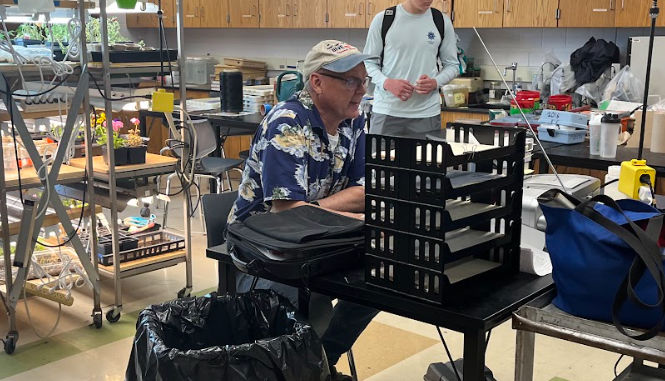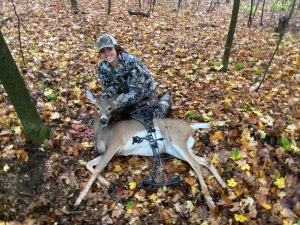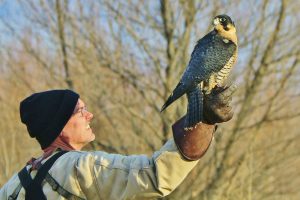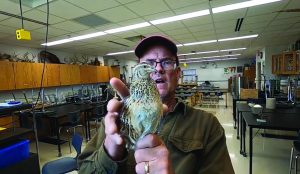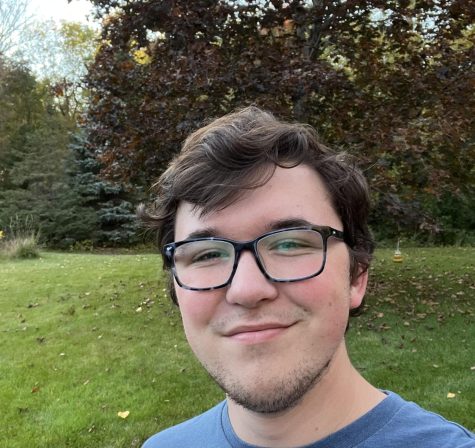Andrew Weaver retires after more than 30 years of teaching
Andrew Weaver sits helping guide students through their final projects. He lets students choose whatever they want for their final research project. He sets the guard rails and helps when needed, but other than that lets the students have freedom in the project.
May 30, 2023
The hallway was filled with the quiet rumble of students making their way to classes. A distant but familiar screech filled senior Adam McDonald’s ears. He smiled as he neared his destination. The screeching continued as he approached. It echoed around the hall like a million different voices speaking all at once. Adam turned towards the open door and laid eyes on what was making the boisterous screeches. A majestic Finnish Goshawk, stood chained to his perch looking at him with its deep black eyes. Adam smirked at the stubborn bird that his teacher was trying to train. He then walked across the hall into his favorite classroom. The walls and shelves were full of mounted animals with hundreds of beady eyes that looked at him. Tables were filled with messily placed microscopes with samples of lake water for students to explore. He took a deep breath appreciating the beauty in chaos. It was science teacher Andrew Weaver’s room. His favorite teacher and he was going to miss him.
Weaver, who has been a teacher for more than 30 years, announced we will retire at the end of the school year. His unique teaching style and the interesting skills he taught brought a legacy that will not be forgotten. He nurtures students’ love of the outdoors with his class and hopes to continue to do so even after retirement. His passions were what he taught and he helped students find theirs.
“The fieldwork that we do grows appreciation of the different fish, the different birds, the different trees so it’s really to better prepare these students to experience the wild and know something about it,” Weaver explained.
Over 30 years ago, Weaver walked into a school not to teach, but to perform music for an Earth Day program. He took a liking to the school and was hired as a science teacher at Stillwater Area High School the next fall. Due to an immense background in falconry, Weaver was able to start the falcon project at the school. He saw a decline in the population of peregrine falcons and decided that he could do something about it. The project was given a $40,000 grant from Legislative-Citizen Commission on Minnesota Resources and the project has been up and running all of Weaver’s career. The project has bred and raised over 100 adult falcons and released them into the wild. Weaver’s passion for wildlife gave students a unique and hands-on experience.
Junior Grace Grant explained, “Weaver gives up his life for his falcons and birds,” and that “like any falconer will tell you, it’s just their passion.”
Falconry and the outdoors were not Weaver’s only passions. Teaching was his thing. He enjoyed being able to show a different view of the world to his students. He brought a lot to the table, but what he really excelled at was the excitement he brought to what he taught. He wanted his students to be able to feel the same way he felt about every bird, tree, fish and deer. He wanted to allow students to dive as deep as they want into the outdoors and their curiosities.
Weaver explained that he hoped his students would, “learn to enjoy the outdoors,” and be able to appreciate and, “plug in,” to them more often.
Since Weaver had diverse interests and contacts within the science community, he was able to provide unique projects for his students. Not only did the students get taught through his falcon project he was able to provide other hands-on learning opportunities. Students were able to raise trout for a program called Trout Unlimited and release them into Browns Creek to help the trout population. They were also able to trap and then put radio collars on deer. These collars would transmit information that could help with the conservation of the species. These special hands-on activities allowed students to learn by exploration.
Grant explained how Nato, a Finnish Goshawk, injured his tailfeathers in his past cage. She, McDonald and Weaver then were able to replace those feathers and she is grateful for the opportunity Weaver gave her and McDonald.
Teaching is not just about the experiences that can be provided to students, it is also the teaching style itself that can make an impact. Weaver had always had an interesting way of teaching. He liked to let students learn and grow independently with him being their guardrails. He would give them the power to choose their projects for finals and research and would help them from afar. During everyday lessons, he would teach through stories of the experiences he has had over the years. These stories would draw students in and help them understand what they were learning.
“His way of teaching us is through stories and just talking and it’s all very interesting and like you just pay attention because you just want to know what he’s talking about. And then you don’t even realize you’re learning,” senior Anna Bushlack said.
After his long career, Weaver decided that it was time for his next adventure. He planned to continue to love the outdoors by fishing, continuing falconry and tapping trees for maple syrup. Weaver also planned on spending more time with his wife. They are working on ideas that will give them activities to keep them both busy. Weaver had always loved three things: the outdoors, his wife and his students, and though, he had to let go of Stillwater after more than 30 years of service, he was excited to see what comes next.
Weaver explained that along with being outside and doing things he loves he and his wife might not stay away from teaching for long. They both loved teaching and think “a teaching abroad stint,” would be “kind of fun.”
Weaver’s influence has touched the lives of students, teachers and the community. He had tirelessly served the community and his students with projects and stories that would never be forgotten. His passion for who he teaches and what he teaches helped give the school all that it has to offer today. Though Weaver will be gone for now, he still hopes to share his passion for the outdoors with the world.
“Stillwater has been a really good place to land. It’s been a really good place to teach. It still is a great place to teach,” Weaver said.


